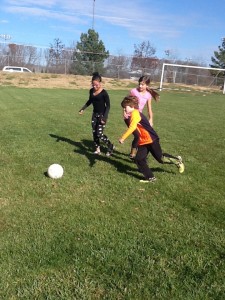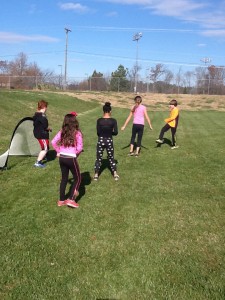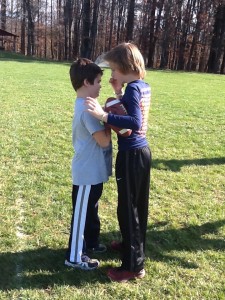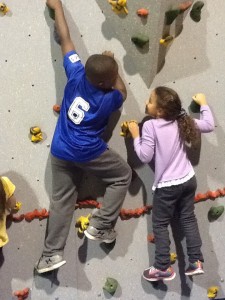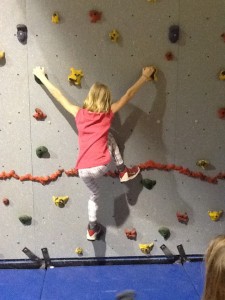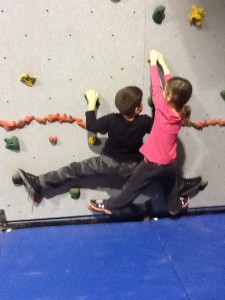This Holiday Edition of the Physical Education blog is all about keeping kids active to build stronger bodies and stronger minds. First and foremost, it is important for parents to set an example by being active and making fitness a priority in your home.
In PE class at this time of year, we try to do a variety of activities inside and outside so that we can keep the students engaged and moving. While we are outside we enjoy soccer and flag football, and while we are inside the students love to scale the climbing wall in pairs. Check out our photos below from this month's activities.
Keeping the children active during the holiday season is especially important due to the overeating that is typical at this time of year.
Its no secret that physical activity also improves brain functioning. As you can see from the sample brain scans below, a mind on exercise is an active mind! Look at the brain functioning after just 20 minutes of walking. Getting kids to move helps strengthen and stimulate their brains. This is why so many recent research studies are showing increased fitness = improved academics. Note: The blue color represents inactivity in the brain.

Here are a few tips that might be some help during the holidays to keep your kids active.
The following are tips from www.raisesmartkid.com in an article entitled The Benefits of Exercise on Your Kid's Brain.
- Set example to kids by being active yourself. Engage in a lot of walking, running, biking or playing sports. A study suggests that preschool kids whose moms are active also tend to be active themselves. According to Esther van Sluijs from the University of Cambridge School of Clinical Medicine who made the study, parents affect their kids in three ways – by acting as role models, by helping them to be active, and by being active with them.
- Make fitness a priority in your home. Set limits on watching TV, playing video games, and being in the internet.
- Make fitness fun. Engage your kids in fun sports or other games which he loves. Also, don’t limit your kid to playing traditional sports. There are video games like Dance Dance Revolutin that can be played actively.
- Encourage your kid to walk. Don’t use the car if you and your kid are going to places where you can walk to. Look for opportunities to walk, find places to stride like a mall, and stairs to climb. Build you kid’s walking muscles so that distances that used to be far for him will feel near. Make your child get used to and love walking. This will benefit him throughout his life.
- Encourage your kid to run. Teach him the joys of jogging. Run with your kid, or make it a social activity, with friends or relatives.
- Encourage your kid to use wheels. Not wheels of a car, but bikes, scooters, rollerblades or skateboards (make sure they have adequate protection like helmet, elbow pads, long pants). On his next birthday, give him one of these gifts instead of another video game.
- Encourage your kid to dance. Dancing is one thing some kids enjoy more than conventional exercise.
- Encourage some competition. If your kids have other family members or friends, make them compete with each other in a fun way. For example, there’s always the running race (give the younger kid a distance advantage), but you can think of other creative contests like who can do the most jumping jacks, skipping rope, etc.
- Go to regular outings. Take a hike. Explore a nearby park. Enjoy the outdoors. Remember to bring a ball or a frisbee.
- Don’t be too strict about an active life. Although a regular routine of being active is what’s best, perfection is not your goal. When your kid has a busy day, try to get him to do his best to be active, but if this is not possible, schedule longer activity days when he has more time.
- Parents of teens should be cautioned against having their kids play contact sports like football. According to Dr. Robert Cantu, chairman of the Department of Surgery at Emerson Hospital and co-director of the Center for the Study of Traumatic Encephalopathy at the Boston University School of Medicine, kids under the age of 14 should not be involved in collision sports. Teenagers who played contact sports often already show signs of chronic traumatic encephalopathy, or CTE, a degenerative brain disease caused by multiple blows to the head. The symptoms are personality changes, memory loss, depression, even dementia.

